 By Christine Darg
By Christine Darg
Jerusalem Channel
Despite a world filled with anxieties and uncertainties, during the wonderful Feast of Tabernacles God’s instructions are to rejoice and not to come before him empty-handed. Thus joy and generosity are characteristics of this holiday.
We were reminded in David Pileggi’s great sermon at Jerusalem’s Christ Church that one cannot be cranky during Sukkot (Tabernacles) and this attitude of joy and rejoicing should be a rehearsal for all the days of the year. Psalm 100 is associated with the Feast of Tabernacles, and a Bible commentary explained that the joy of this psalm is not a naive joy but one that has weathered the storms of life and has triumphed.
Therefore joy is not just an emotion–it is a discipline!
These thoughts brought to mind one of my favourite quotes from the life of my great hero Watchman Nee, who died as a persecuted Christian in a Chinese concentration camp. His last letter from prison contained the phrase, “I maintain my joy.”
All over Israel temporary booths are fragile shelters erected on balconies and in gardens for family dwellings for one week, reminiscent of when the Israelites lived in the wilderness and their only real shelter was the Almighty!
At the beginning of Sukkot (booths) we were reminded at the Christ Church service that these days are days of holiness and separation from evil. During Sukkot we don’t come to God “just as I am,” but we come prepared, consecrated and eager to give what God has put in our hands to give to Him. It is a time that has been prepared by the preceding holiday of Yom Kippur, a day of great introspection. But now after our season of preparation we come in purity, sanctified by the Blood of the Lamb, and we dwell in fragile temporary shelters emblematic of our existence in the desert, which humanly speaking can be a place of anxiety, a place of scarcity: Can God set a table in the wilderness? Yes! We rejoice in our succas and overcome anxiety because the Lord our Keeper and Guardian commands us to have a holy party. God commands us to be joyful, even the cranky ones. Joy IS the fruit of the Spirit but it is also discipline. The real purpose of joy is gratitude to the Lord. Are we really grateful without joy?
Somebody on Facebook asked me if celebrating the Feast of Tabernacles has any relevance to the New Testament and my answer is absolutely! 100 per cent! Of the seven Levitical feasts of the LORD, the Feast of Tabernacles is the most universal and prophetic in the sense that every biblical feast has a past but they also have a future fulfilment. The Feast of Tabernacles is destined to be celebrated during the soon-coming Millennium when God dwells on earth and his knowledge (devotion) will cover the earth as the seas. Zechariah 14: 16-21 prophesies All Nations Will Worship King Messiah During Feast of Tabernacles:
“Then all the survivors from the nations that came against Jerusalem will go up year after year to worship the King, the LORD of Hosts, and to celebrate the Feast of Tabernacles. And should any of the families of the earth not go up to Jerusalem to worship the King, the LORD of Hosts, then the rain will not fall on them. And if the people of Egypt will not go up and enter in, then the rain will not fall on them; this will be the plague with which the LORD strikes the nations who do not go up to celebrate the Feast of Tabernacles. This will be the punishment of Egypt and of all the nations that do not go up to celebrate the Feast of Tabernacles.
On that day, HOLY TO THE LORD will be inscribed on the bells of the horses, and the cooking pots in the house of the LORD will be like the sprinkling bowls before the altar. Indeed, every pot in Jerusalem and Judah will be holy to the LORD of Hosts, and all who sacrifice will come and take some pots and cook in them. And on that day there will no longer be a Canaanite in the house of the LORD of Hosts.”
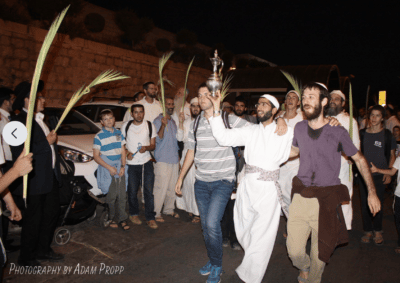
Reliving the Water Libation Ceremony (photo courtesy of Temple Institute; Facebook screenshot)
We have been getting in on the vanguard by rehearsing this great feast with the International Christian Embassy Jerusalem since 1980. And according to John 7: 37-38 during the water libation ceremony of the Feast of Tabernacles, “On the last and greatest day of the festival, Jesus stood and said in a loud voice, ‘Let anyone who is thirsty come to me and drink. Whoever believes in me, as the Scripture has said, ‘Out of his heart will flow rivers of living water.’”
When the Temple stood in Jerusalem, a unique service was performed every morning throughout the Sukkot holiday: the Nisukh HaMayim(lit. “Pouring of the water”) or Water Libation Ceremony. According to the Talmud, Sukkot is the time of year in which God judges the world for rainfall; therefore this ceremony, like the taking of the Four Species, invokes God’s blessing for rain in its proper time. According to the Mishnah (Tractate Sukkot 4:9 [1] and 4:10 [2]) the water for the libation ceremony was drawn from the Pool of Siloam (Hebrew: בְּרֵכַת הַשִּׁילוֹחַBreikhat HaShiloah) in the City of David and carried up the Jerusalem pilgrim road to the Temple. The joy that accompanied this procedure was palpable.[3]
Afterwards, every night in the outer Temple courtyard, tens of thousands of spectators would gather to watch the Simchat Beit HaShoeivah (Rejoicing at the Place of the Water-Drawing), as the most pious members of the community danced and sang songs of praise to God. The dancers would carry lit torches, and were accompanied by the harps, lyres, cymbals and trumpets of the Levites. According to the Mishnah, (Tractate Sukkah 5:1 [4]), “He who has not seen the rejoicing at the Place of the Water-Drawing has never seen rejoicing in his life.”
On the seventh day of the festival this water libation ceremony reached its apex. Temple priests circled the altar seven times and poured out the water on the altar. For seven days the people would cry out for redemption and salvation while shaking palm branches.
This great day of the feast is traditionally called Hoshana Rabba with the sounding of the shofar and reciting: “Hoshiah na! Save us, please!”
Rabba in biblical Hebrew means “master” or “great” and hoshana has the meaning of rescue, save, deliver, or savior.
The Saviour did come and He is coming again! Meanwhile, the utmost rejoicing in life is when living water flows out of our innermost being, as Jesus, Israel’s greatest native Son, had prophesied!

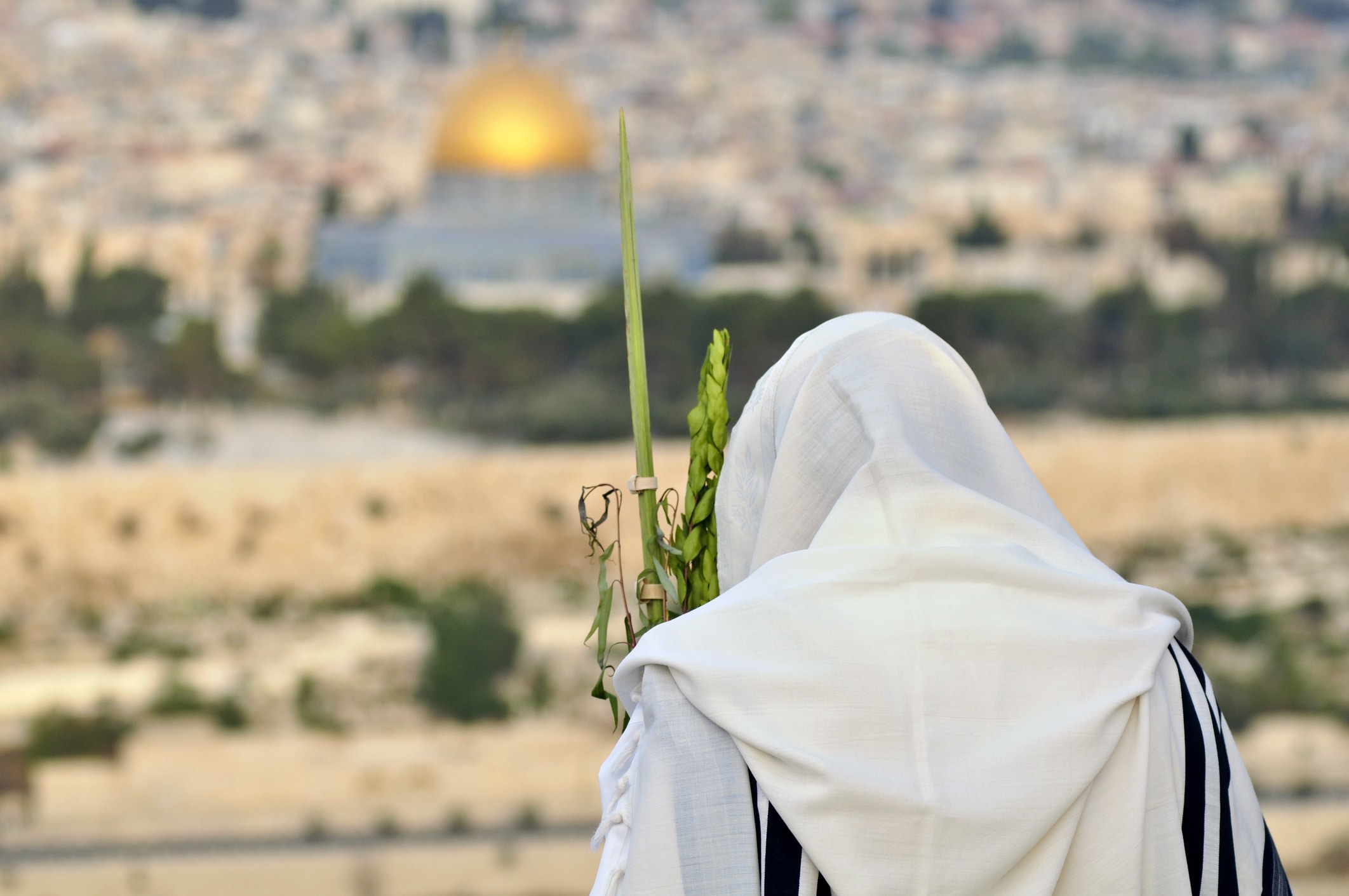
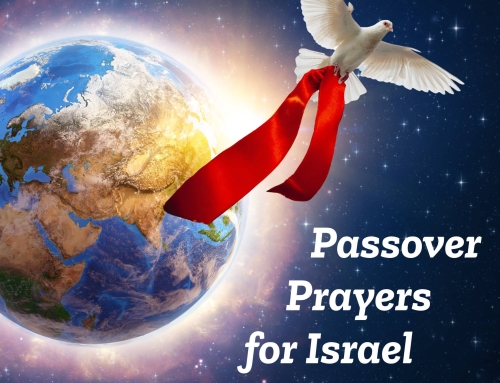
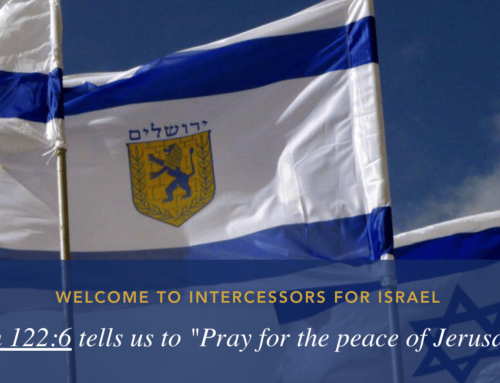
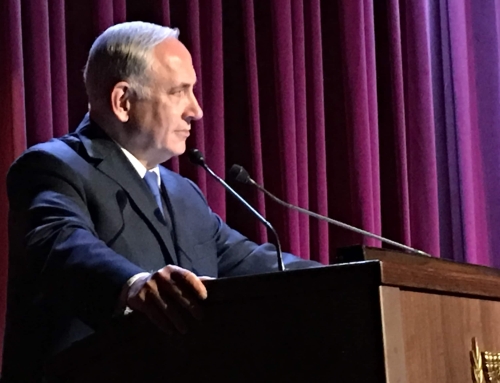
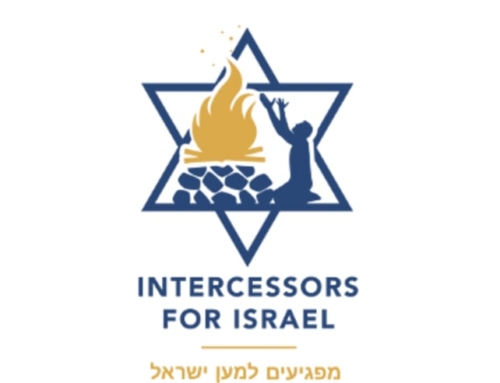
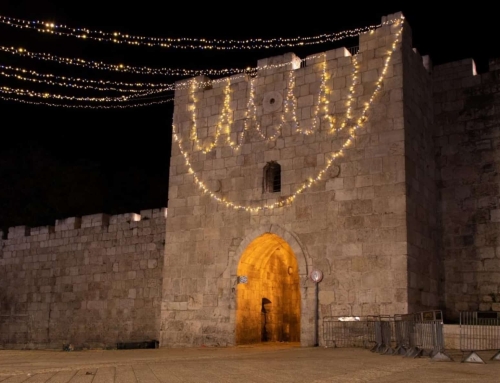
🌹🔥✝️👑🙏🏼🔥
That was BEAUTIFUL, I didn’t understand a single word, but the joyfullness, was AWESOME, MAGNIFICENT.
I PRAISE THE LORD ALMIGHTY, I LOVE YOU JESUS, 💖 ALWAYS AND FOREVER 🙏🏼🔥